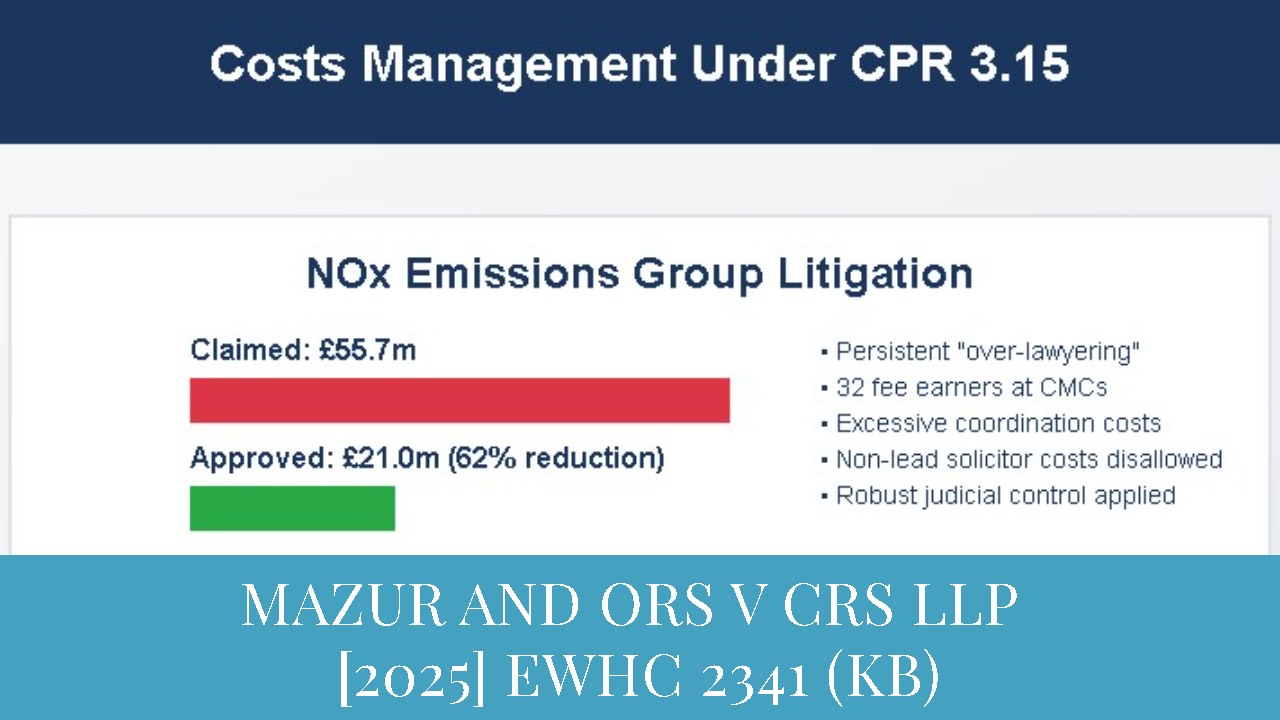The High Court’s decision in Rollerteam Ltd v Siddiqi addresses a fundamental but frequently misunderstood aspect of costs recovery: where multiple defendants benefit from a costs order but only one party has discharged the solicitors’ bills, who has the right to recover those costs?
Background
The underlying proceedings arose from a protracted family dispute concerning the Sherlock Holmes Museum in Baker Street, London. On 10 January 2019, Tariq Siddiqi commenced proceedings against five defendants claiming £4,149,911.84 in damages for alleged blackmail, harassment and libel. The defendants were represented by RPC under a joint retainer arrangement.
On 24 May 2019, following applications for strike out and summary judgment, Warby J made comprehensive orders in the defendants’ favour. He dismissed Siddiqi’s applications, granted summary judgment for the Second to Fifth Defendants, and struck out the claim save for the harassment allegations against the First Defendant. Crucially, he ordered Siddiqi to pay all five defendants’ costs of four separate applications, to be assessed on the standard basis if not agreed, with a payment on account of £39,938.52.
The Critical Payment Dynamic
What emerged during the subsequent detailed assessment proceedings was that whilst all five defendants had benefited from Warby J’s costs order, only the Fourth Defendant (Rollerteam) had actually paid RPC’s bills. The other defendants, despite being named beneficiaries of the costs order, had discharged no liability to the solicitors and therefore had no costs to recover.
This arrangement is more common in practice than many appreciate. In family business disputes, partnership litigation, or group actions, it frequently occurs that one party agrees to bear the legal costs on behalf of all co-defendants, whether for reasons of financial capacity, strategic control, or simple necessity when other parties become uncooperative or insolvent.
The Detailed Assessment
Following directions from Costs Judge Rowley in December 2022, the defendants were required to commence detailed assessment proceedings by 15 February 2023. Only Rollerteam served a Notice of Commencement, claiming costs of £82,432.78. The other defendants could not do so – having paid nothing to RPC, they had no bills to serve.
On 27 April 2023, the Costs Judge made an unless order requiring Rollerteam to serve a revised bill that would indicate, where work was done jointly for multiple defendants, what proportion was claimed on behalf of Rollerteam specifically.
Rollerteam duly served a revised bill totalling £75,228.43. However, rather than attempting to apportion costs between the five defendants, they argued in detailed Assessment Notes that since RPC had represented all defendants under a joint retainer, and the costs orders were in favour of all defendants, there was no realistic basis for apportionment. They claimed 100% of the common costs, with only a 10% reduction for work done exclusively for the First Defendant on the harassment claim.
The bill stated explicitly that “100% of the costs incurred in relation to the injunction application, the disclosure application, the strike-out application and the amendment application were incurred for the benefit of the fourth defendant, just as 100% of those costs were incurred for the benefit of the first, second, third and fifth defendants.“
The Costs Judge’s Decision
On 15 August 2023, Siddiqi applied to strike out Rollerteam’s revised bill for non-compliance with the unless order. Following a hearing on 17 November 2023, Costs Judge Rowley granted the application, finding material non-compliance and striking out the bill entirely, assessing Rollerteam’s recoverable costs at zero.
The Costs Judge held that since only Rollerteam was seeking costs recovery, any work done for the defendants generally needed to be “divided appropriately so that only the costs for which the fourth defendant is liable are sought from the claimant.” He concluded that the bill failed to reflect “realistic sums that may be recoverable for one of five defendants” and that the costs draftsman had wrongly attempted to circumvent the apportionment requirement.
The Appeal
Rollerteam appealed to the High Court.
On 17 March 2025, Mr Justice Rajah allowed the appeal. The Judge held that Rollerteam had complied with the unless order by clearly identifying that all work was done jointly for multiple defendants and stating that it claimed 100% of that work for its own benefit (save for the specified 10% reduction).
More significantly, the Judge clarified the fundamental principle governing recovery of common costs in joint retainer cases. The correct approach is not to assume automatic apportionment based on the number of defendants, but to ask whether the common costs would have been reasonably incurred by the paying defendant in any event to defend itself from the claimant’s allegations.
Legal Principles Established
The judgment establishes several important principles:
- Where defendants are represented under a joint retainer but only one party discharges the solicitors’ bills, that party is entitled to commence detailed assessment proceedings in its own name and recover the costs it has paid, without requiring participation from the non-paying co-defendants.
- Common costs need not be divided between multiple beneficiaries of a costs order where those costs would have been necessarily incurred for the paying party’s own defence regardless of the number of co-defendants involved.
- Following the principle established in Haynes v Department for Business, Innovation and Skills, costs such as court fees, conferences with counsel, and legal research that would have been incurred whether defending one client or multiple clients should be recoverable in full by the paying party.
- Courts should interpret unless orders pragmatically, focusing on whether the required information has been provided rather than whether the claiming party’s approach appears “realistic” to the judge.
Practical Implications
For practitioners, the decision provides important guidance:
- When preparing bills in multi-defendant cases, focus on explaining why common costs were necessary for the client’s own defence rather than attempting artificial mathematical apportionment between co-defendants.
- Where representing the paying defendant in a joint retainer situation, emphasise that the question is not how many parties benefited from the work, but whether the costs would have been incurred in any event for that client’s own protection.
- Ensure bills respond directly to the specific requirements of case management orders, but do not feel compelled to accept assumptions about apportionment that may not reflect legal principle.
Conclusion
Rollerteam Ltd v Siddiqi clarifies an area where costs practice has often been unnecessarily complex and provides welcome guidance for the many cases where multiple defendants share representation but only one party bears the financial burden. The decision confirms that the party who actually discharges solicitors’ bills under a joint retainer is entitled to recover those costs without artificial reduction, provided they were reasonably necessary for that party’s own defence.
The judgment serves as a reminder that costs recovery should be governed by practical realities and legal principles rather than superficial mathematical divisions that bear no relation to the work actually required or the liabilities actually incurred.

![ROLLERTEAM LTD V SIDDIQI [2025] EWHC 612 (Ch)](https://tmclegal.co.uk/wp-content/uploads/2025/04/shutterstock_66935659-1000x630.webp)
![FERNANDEZ V FERNANDEZ [2025] EWHC 2373 (Ch)](https://tmclegal.co.uk/wp-content/uploads/2025/09/Willis-Title-copy-copy-copy-copy-6.jpg)


![STOCKLER AND ANOTHER V THE CORPORATION OF THE HALL OF ARTS AND SCIENCES [2025] EWHC 2262 (SCCO)](https://tmclegal.co.uk/wp-content/uploads/2025/09/YT-Thumb-300x169.webp)











![HUNT V OCEANIA CAPITAL RESERVES LTD & ORS [2025] EWHC 837 (CH)](https://tmclegal.co.uk/wp-content/uploads/2025/04/Shutterstock_1388324822-80x80.webp)
![BARRY & ANOR V BARRY [2025] EWHC 819 (KB)](https://tmclegal.co.uk/wp-content/uploads/2025/04/shutterstock_416432836-80x80.webp)